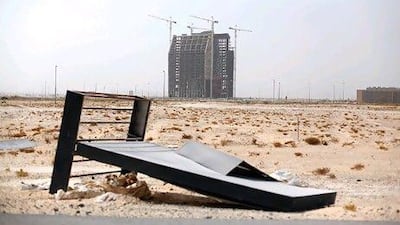Half the buyers in a Dubai Sports City apartment project are in default on their purchases, underscoring the problems facing developers in the Dubailand development.
Many of the defaulters in Rufi Twin Towers are investors who bought at the height of the market, said Rameez Rufi, the vice president of Rufi Real Estate.
"People who are looking [at the apartment] as an end user or to rent, they are still paying," Mr Rufi said.
Buyers backing out of their purchases in the face of falling prices and changing economic circumstances have been a major problem for developers in Dubailand, a Dh235 billion (US$63.98bn) master-planned development off Emirates Road.
Many developers have delayed construction because of non-payment by buyers who were unable to arrange financing.
"There are a lot of unfinished buildings standing around in Dubailand," said Hannah Bakshani, a sales consultant for Better Homes.
Several buildings in the Remraam development were delayed "due to non-payments from customers", Dubai Properties Group said in a recent statement.
The default rate was more than 40 per cent among buyers in two towers developed by H&H Investment and Development, said Shahab Lutfi, the company's chief executive.
In some cases, buyers had been allowed to make down payments as low as 30 per cent on condition they would pay the balance at handover. But with prices down as much as 50 per cent in the area from the peak of the property market in 2008, many buyers are choosing to walk away from their purchases rather than make the final payment.
Owners not making their payments often try to sell their units at "any crash price" to get out of the deal, driving down asking prices, but none of those units are selling, Ms Bakshani said. "There are no buyers for off-plan property," she said. "Interest is in finished product." Mr Rufi has chosen to continue construction on the Rufi Twin Towers and expects completion within a year.
Work also continues on the 15-storey Rufi Park View and the 20-storey Rufi Golf Greens in Sports City.
"If 50 per cent are paying, we can make construction," he said.
Rufi Real Estate owns nine plots of land in Dubai Sports City and is developing five projects. The company is swapping properties from delayed projects and renegotiating deals on a "case by case basis", Mr Rufi said.
"Otherwise people will run away," he said. "To sit in this market, you have to listen to the buyers." Rufi Real Estate is the property development arm of the family-owned Rufi Group, a Pakistani company. It began buying land in Dubai in 2005 and now owns more than 35 parcels, Mr Rufi said.
Last week, the company began handing over apartments in Rufi Gardens, an 11-storey apartment building in International City, its first project completed in Dubai.
All the 140 apartments in the building were sold in 2008, typically for between Dh400,000 and Dh1.1 million, primarily to buyers from China, Pakistan and India, Mr Rufi said. The tower is near the Dragon Mart, making it attractive to Chinese buyers, he said. Ninety per cent of the buyers in Rufi Gardens have made their payments, Mr Rufi said. Rents in International City declined 4 per cent in the second quarter from the previous quarter, one of the steepest drops in the Dubai market, as more apartments became available, Asteco Property Management reported.
But the rental yields in International City are still among the best in the city because of the lower original prices, Mr Rufi said.
"From my side, it is an area for middle class, but the rental is very good," he said.

